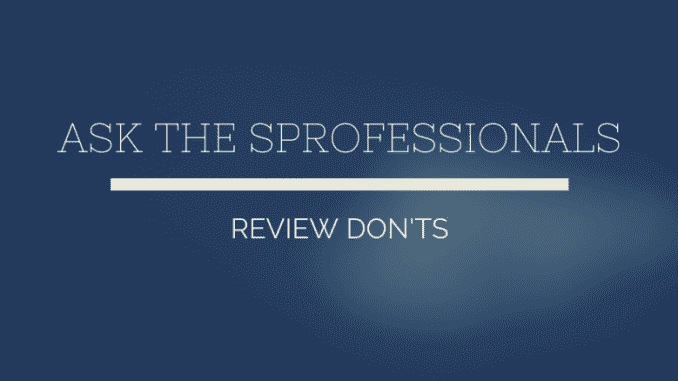
We continue a three-part series by asking industry experts to weigh in on issues around café policy, breaking down the ins and outs of how rules and systems affect morale and retention.
BY RJ JOSEPH
SPECIAL TO BARISTA MAGAZINE ONLINE
From the editor: In March, we began a series on creating effective employee reviews in conjunction with our latest issue’s coverage on annual reviews. We continue the series by talking about the mistakes that can be avoided with these reviews.
Today, a panel of veteran coffee professionals lend their expertise to a subject crucial to employee satisfaction, retention, and engagement: employee reviews and feedback. Productive, constructive reviews and feedback are essential to the growth of any business. But how should a review system look? What mistakes should managers avoid? The ways to construct a harmful review system are endless, but with care, managers can make sure to dodge these pitfalls and create a healthy, beneficial system for employee, manager, and company growth.
The Sprofessionals are here to help break down what managers should stay away from when creating and executing a review system.

The Question: What do you feel managers should avoid during reviews? Can you tell me about the worst review system you’ve experienced?
Meghan-Annette Reida, five years in coffee, freelance barista, and Coffee In Good Spirits competitor
“Managers should avoid talking negatively about any other staff member. No third-party negativity! They should also avoid waiting until the review to bring up performance issues or positive feedback. It should be a summary of the last six months, not blindsiding the employee.
The worst review system I’ve experienced was where there were no regular reviews and no structure when they did occur. I would receive exclusively positive feedback, but no raise.”
Hiu Yan (Sharon) Fung, barista and former café manager
“Don’t humiliate. Don’t imply doubt.”
Jenn Chen, eight years in coffee, coffee marketer
“Managers should avoid giving only praise. No one can grow with only praise.
Besides one place that didn’t have a system at all, the worst was having to put an entire team on a bell curve, regardless of if they matched expectations. Only a certain number could be ‘exceeds,’ a certain number for ‘met,’ etc. These ‘buckets’ also matched with raise amounts.”
Liz Dean, eight years in coffee, area lead (Chicago, DC, and Boston regions) for The Wing, former manager and barista
“The worst review system I’ve experienced was no system at all. It was sort of an arbitrary ‘you’ve done a good job, here’s a random compensation increase.’
I have a WHOLE training I’ve developed on how to conduct performance reviews, in part because performance reviews are one of the easiest ways for unconscious biases to appear. Many managers do not prepare for performance reviews—often because they haven’t established a routine of regularly giving/receiving feedback with direct reports—so they fall prey to things like recency bias (where they rely on their most recent memory of someone’s performance was, rather than the whole six months) or halo/horn bias, and so on. So I strongly encourage managers to have regular 1:1s with set agendas and time dedicated to development and goal setting. Having prepared notes, or metrics/data to reference as part of the conversation, are also extremely important.
Another important thing about reviews is that there should never be any surprises—you shouldn’t be saving up all of this feedback and then just unleashing it on someone every six months. Again, this is another reason why it’s so important to have a regular cadence of communication. It’s also critical that that feedback goes both ways. One of the exercises I’m having the managers who report to me now complete is a ‘user guide’ for themselves, so that we can be really clear about our working and leadership styles and how we best communicate. It makes establishing regular two-way feedback so much easier.”
Tim Cox, 11 years in coffee, business development manager for KLLR Coffee, former café co-owner
“The worst review system I ever experienced was a nonexistent one. Managers should avoid making the mistake of only acting like a manager during a review.”
Bethany Letoto, seven years in coffee, freelance writer, former barista, and roaster
“Until I started at my current job, the closest thing to a review system I experienced was get-togethers or meetings with ownership and management to ‘catch up,’ which usually just served as an airing of grievances with no real actionable feedback, and often would leave me feeling bullied, defeated, and stuck.
Managers should avoid hijacking the conversation. Managers should keep things professional. Managers should formalize reviews! Managers should certainly avoid language (body or otherwise) that can be read as dismissive or domineering. The best managers I’ve ever had really espoused that value of hospitality that we all hope to uphold—they were on my side. However, during reviews, I also have found it to be very detrimental for management to attempt to falsely appear buddy-buddy. If that dynamic is pre-existing, fine! Great! But staff can absolutely see through those types of acts.”
The Takeaways:
- Reviews are important, and the worst review system is no system at all.
- Consistent timing and standards matter—the more transparent, the better.
- Don’t be domineering or unprofessional during reviews.
- Avoid holding back criticism and then unleashing it during reviews.
- Avoid giving only praise rather than highlighting room for growth.
- Make sure reviews are a two-way street.
Do you agree with the Sprofessionals? Let us know your thoughts at info@baristamagazine.com.

ABOUT THE AUTHOR
RJ Joseph works at Red Fox Coffee Merchants as a cupper and content strategist. Following coffee from Pittsburgh to Oakland, Calif., she became a certified Q-Grader and learned to roast, sling bags, and drive a forklift with the pros. Uniting her twin passions for coffee and writing, she launched a blog in 2016, then started freelancing, always maintaining a central focus on the ways in which coffee can make the world a more equitable place. She also runs a coffee satire site called The Knockbox. Outside of work, you’ll probably find her cooking, tending her many plants, listening to records, and walking around the city.

